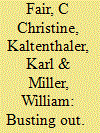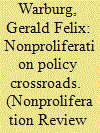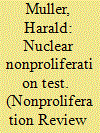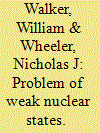|
|
|
Sort Order |
|
|
|
Items / Page
|
|
|
|
|
|
|
| Srl | Item |
| 1 |
ID:
118377


|
|
|
|
|
| Publication |
2013.
|
| Summary/Abstract |
This report explores Iranian popular opinion on the Treaty on the Non-Proliferation of Nuclear Weapons (NPT) and the determinants of Iranian attitudes. Using data from a 2008 survey of 710 Iranians administered by the University of Maryland's Program on International Policy Attitudes, we find that that a significant minority of Iranians (10 percent in 2006 and 14 percent in 2008) would prefer that Iran withdraw from the NPT. Our statistical analysis shows that Iranians who fear a US attack on Iranian nuclear facilities and distrust the International Atomic Energy Agency are more likely to want to quit the NPT. We therefore argue that those who do not trust other nations are most likely to oppose the NPT.
|
|
|
|
|
|
|
|
|
|
|
|
|
|
|
|
| 2 |
ID:
115301


|
|
|
|
|
| Publication |
2012.
|
| Summary/Abstract |
On October 1, 2008, Congress enacted a proposal that originated with President George W. Bush in 2005 to approve an unprecedented nuclear trade pact with India by removing a central pillar of US nonproliferation policy. Despite the numerous political challenges confronting the Bush administration, the initiative won strong bipartisan support, including votes from Democratic Senators Joseph Biden, Hillary Clinton, and Barack Obama. The four-year struggle to pass the controversial US-India nuclear trade agreement offers an exceptionally valuable case study. It demonstrates a classic tradeoff between the pursuit of broad multilateral goals such as nuclear nonproliferation and advancement of a specific bilateral relationship. It reveals enduring fault lines in executive branch relations with Congress. It vividly portrays challenges confronting proponents of a strong nonproliferation regime. This article is based on an analysis of the negotiating record and congressional deliberations, including interviews with key participants. It assesses the lessons learned and focuses on three principal questions: how did the agreement seek to advance US national security interests?; what were the essential elements of the prolonged state-of-the-art lobbying campaign to win approval from skeptics in Congress?; and what are the agreement's actual benefits-and costs-to future US nonproliferation efforts?
|
|
|
|
|
|
|
|
|
|
|
|
|
|
|
|
| 3 |
ID:
102393


|
|
|
|
|
| Publication |
2011.
|
| Summary/Abstract |
The most important short-term success of President Barack Obama's nuclear weapons policy has been to halt the erosion of the Treaty on the Non-Proliferation of Nuclear Weapons (NPT). Obama's policies helped extract a minimum positive result from the 2010 NPT Review Conference, a favorable outcome compared to the chaos that his predecessor's representatives had created at the 2005 conference. However, the result is only a compromise of the least common denominator between the nuclear weapon states and the Non-Aligned Movement (NAM). The nuclear weapon states refused to agree to any specific actions or deadlines for disarmament, while the NAM states rejected any strengthening of the nonproliferation toolbox. The 2010 conference's final document is thus an exercise in minimalism, with the notable exception of the section addressing the Middle East. As measured by delegates' statements, the Obama policy was welcomed as a positive development. This factor enabled key players, such as Egypt and Brazil, to strive for compromise, and others, such as Russia and China, not to block it. This outcome owes more to the "Prague spirit" and the New START than to the Nuclear Posture Review. By compromising on the Middle East, the Obama administration showed the necessary flexibility to motivate the key NAM actor, Egypt, to deliver the agreement of that bloc, foiling the intentions of Iran to prevent a consensus.
|
|
|
|
|
|
|
|
|
|
|
|
|
|
|
|
| 4 |
ID:
127123


|
|
|
|
|
| Publication |
2013.
|
| Summary/Abstract |
Governments are increasingly recognizing the problem posed by internally weak nuclear-capable states. The problem, however, is under-theorized. This article brings together literature on sovereignty and international order, the nonproliferation regime, and weak states, and introduces new concepts to provide a more structured understanding of this problem. Insight comes from focusing attention on the function and governance of two nuclear estates (termed the production and operational estates), and on their resilience to decay and disorder occurring within the state and society. Drawing on empirical observation, the authors suggest a typology of weakness in nuclear states, involving state fragmentation typified by the former Soviet Union, the "hard weak state" typified by North Korea, and the internally conflicted state typified by Pakistan. Although these types give rise to distinctive difficulties, their alleviation depends heavily on the maintenance of internal authority within the state and estates, the presence or absence of cooperative relations, and the international regulatory framework's vitality.
|
|
|
|
|
|
|
|
|
|
|
|
|
|
|
|
| 5 |
ID:
114434


|
|
|
|
|
| Publication |
2012.
|
| Summary/Abstract |
The negotiating history of Article IV of the Treaty on the Non-Proliferation of Nuclear Weapons (NPT) is analyzed using previously overlooked archival sources. Contrary to received wisdom, there was a lively debate in the spring of 1968, much of it restricted to behind-the-scenes exchanges between Washington and London, over the proliferation risks of gas centrifuge technology for uranium enrichment. The United States put its faith in classification, safeguards, and peaceful use. The United Kingdom feared that clandestine enrichment using centrifuges would render the NPT a dead letter.
|
|
|
|
|
|
|
|
|
|
|
|
|
|
|
|
|
|
|
|
|